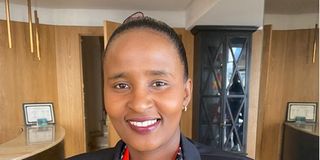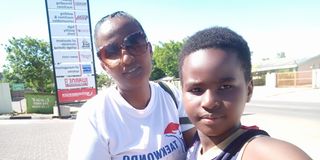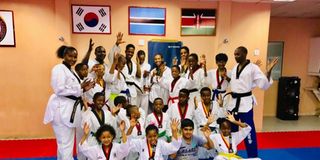Gladys Njoroge: Kenyan taekwondo coach taking Botswana by storm

Bostwana's Taekwondo Federation Technical Director, Gladys Njoroge.
What you need to know:
- God has been faithful to me. I have walked this journey of Taekwondo through His grace.
- It has not been easy to shine in what is mostly a male-dominated sport, but I am grateful to all that have contributed in my career in Taekwondo.
Gladys Njoroge moved to Botswana in 2004 and currently serves as the country’s Taekwondo Federation Technical Director.
Nation Sport caught up with the humble 42-year-old lady from Ndumberi, Kiambu County for an exclusive One on One interview.
Who is Gladys Njoroge?
Gladys Njoroge is first and foremost a mother to a 12-year-old boy known as Phillip Pendo and I am married to Lloyd Litswa. I love Taekwondo and I am a level two International coach. I am a fifth Dan Master, Director of Tae Sports Taekwondo Academy, and the Technical Director of the Botswana Taekwondo Federation.
Tell us about your upbringing and early childhood.
I was born in Kiambu, Ndumberi to be specific. We are four siblings and I am the second born. I went to Madaraka Primary School, which is a boarding school in Thika and I would say most my youthful years were spent in school - from class 3 to 8 I was only home during the holidays.
How did your early childhood and upbringing shape who you are today?
It did play a big role since most of my playmates were boys - from my cousins to my family friends. I always found myself to be the only girl who could fit in. My grandparents were into business - selling fresh produce and to me, business and sports flow naturally to date.
How did you fall in love with Taekwondo? How did it all begin?
Like I said I always fitted among the boys and therefore l had to develop a defense attitude because I liked challenging the boys. My firstborn sister joined the Taekwondo club at Senior Chief Koinange High School and during the holidays, she was always demonstrating what she learned. I fell in love with the sport and once I joined high school, I was in the hall waiting for the coach to begin my classes.
Who has played a very big role in your career so far and why?
My parents have contributed the biggest part since they have always supported me throughout my life journey. In terms of Taekwondo, my secondary school coach Master George Wasonga and Master Patrick Ngana of the KCB Taekwondo Club, who is still the biggest supporter in my Taekwondo journey, have played a very critical role.
Briefly take us through your career path. Where it all started as a taekwondo player to where you are now as a coach
From 1994 to 1997 I was in the Taekwondo Club at Senior Chief Koinange High School. After I was done with school I joined the Bata Taekwondo Club in Limuru.
My family would later move to Makuyu and I had to move to. I started a small Taekwondo Club in Makuyu which known as Don Bosco to keep me busy and engaged in the sport I loved.
I joined the national team in 2000 and moved to the Kariokor Taekwondo Community Club. I finally settled at the KCB Taekwondo Club in 2003 until I moved to Botswana in 2003.
When I left for Botswana I did not know that life was preparing me for a different call. I love being an athlete but everything got me by surprise when I settled in Botswana. After three months in Botswana, I luckily found a club training Taekwondo.

Gladys Njoroge (left) with her son, Phillip Pendo.
By coincidence when I visited I was welcomed by the late master Charles Kamau. I felt at home since we knew each other from the Bata Limuru Taekwondo club. I joined him as an assistant trainer only for him to pass after three months of working together.
I was young and confused. His last words where you will have to take it up and see that Taekwondo in Botswana gets global recognition in the world. Today I am glad to have achieved that and will always remain indebted to him.
What is the state of Taekwondo in Botswana as compared to Kenya?
Today, Taekwondo is practiced in many schools in Botswana, both private and government institutions but mostly on a voluntary basis. Botswana has a smaller population than Kenya and the latter is very advanced in terms of Taekwondo members and clubs, but Botswana has a better system of managing everything I have to admit.
What are some of the biggest lessons you have learned in your life that you would share with the youth back at home who want to take the same career path?
Nothing good comes easy in life. You have to respect everyone, work hard, and be dedicated to whatever you do. The future of sports, mostly Taekwondo is in the youth and therefore have to invest their time in improving their skills and learning from the elders of the game.
How has Covid-19 affected your work in Botswana?
I was forced to close the academy since April and I am currently training only one athlete, Karabo Kula under the Olympic Training Program.

Gladys Njoroge with some of her students.
Any memorable moments of your life in Kenya?
I miss my family and friends. I enjoyed visiting new places and busy Nairobi. I also miss the Kenyan delicacies. I visit yearly mostly in December and I am looking forward to doing that again.
What do you do when you are not actively working around Taekwondo?
I am into farming and businesses. I would say business and farming support my Taekwondo life.
If you were not a Taekwondo coach, what would you be doing?
I would have been a business lady since entrepreneurship runs in my family - from my grandparents to my parents, to me, and now I see the same in my son.
Your parting shot?
God has been faithful to me. I have walked this journey of Taekwondo through His grace. It has not been easy to shine in what is mostly a male-dominated sport but I am grateful to all that have contributed in my career in Taekwondo.




